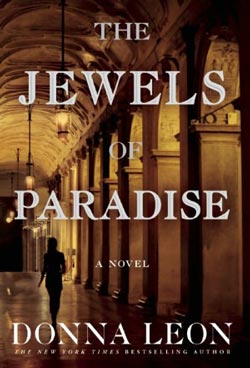
The Jewels of Paradise by Donna Leon is a stand-alone traditional mystery (available October 2, 2012).
Caterina Pellegrini is a native Venetian, and like so many of them, she’s had to leave home to pursue her career. With a doctorate in baroque opera from Vienna, she lands in Manchester, England. Manchester, however, is no Venice. When Caterina gets word of a position back home, she jumps at the opportunity.
The job is an unusual one. After nearly three centuries, two locked trunks believed to contain the papers of a baroque composer have been discovered. Deeply connected in religious and political circles, the composer died childless; now two Venetians, descendants of his cousins, each claim inheritance. Caterina’s job is to examine any enclosed papers to discover the “testamentary disposition” of the composer. But when her research takes her in unexpected directions she begins to wonder just what secrets these trunks might hold.
I was familiar with the work of author Donna Leon through her twenty-one volume Commissario Guido Brunetti series, which I first discovered a couple of decades ago in my local library. (A twenty-second volume is due out in 2013.) However, The Jewels of Paradise, though set in Italy like the Brunetti books, is a stand-alone, or perhaps the first in a new series. What the new book shares with Leon’s previous work is strong scene-painting and the author’s scholarly knowledge of musical history, this time emerging through her protagonist.
Unlike Brunetti, Caterina Pellegrini is an amateur detective. She’s a native Venetian and an expert in baroque opera, recently returned to Venice after a stint abroad. The mystery revolves around the composer Agostino Steffani, who though a real person is not well-known today. (In an interesting twist, Leon wrote the book because of a request from singer Cecilia Bartoli, who has recorded some of Steffani’s work.) The musical aspects were my favorite element throughout.
It was intriguing seeing the composer and his work through the eyes of someone who had dedicated her life to exploring musical history. Caterina’s desire to know more about the composer is complicated by the strange circumstances that allow her to examine rare documents associated with Steffani.
. . . if they were the papers of what her profession would call a major minor composer, dead these three centuries, what was their value? The Stabat Mater was a masterpiece, and the few opera arias she knew were wonderful, though strangely short to the modern ear. She’d gone down to London to see Niobe a few years ago and found it a revelation. What was that heart-breaking lament, something about “Dal mio petto”? With a key change towards the end that had driven her wild when she heard it and then again when a musician friend had shown her the score. But her personal excitement would hardly influence the price put on a manuscript. A page of a score by Mozart was worth a fortune, or Bach, or Handel, but who had ever heard of Steffani? And yet the cousins were willing to hire a lawyer/arbitrator and pay her salary? For two trunks they thought were full of papers?
“. . . no one much values Steffani’s music these days.” She said it with regret, thinking of the beauty of the arias and the mastery shown in the Stabat Mater. Maybe it was time for a return to the stage for the good Bishop?
Caterina would benefit professionally if she found anything of particular rarity. She would have the right to publish academic papers illuminating Steffani’s life and music, or to edit any unpublished musical manuscripts. Though it’s clear she’s excited by those possibilities, her real passion emerges when she speaks of the music itself. Caterina’s emotional involvement with her work made the plot more intriguing to me; I also found unexpected moments of beauty in her musings on music and musical performance.
The art was the sound; the beauty was in the singing or the playing: to want to own the notes written down on paper, to place a greater value on the paper if it bore the signature of the composer, seemed to her an impure desire. She remembered something from her school catechism classes, about the sin of worshipping “graven images.” Or maybe it was the sale of indulgences she was thinking of. Or perhaps she wasn’t thinking at all and didn’t really need a comparison: it was creepy and it was wrong to think that the written music was the real music.
This book should be enjoyable for baroque music fans regardless of whether or not they normally read mystery novels. Fans of the Carlo Brunetti series will likely also enjoy Leon’s new foray into contemporary Venice.
See more coverage of new releases in our Fresh Meat series.
Victoria Janssen is the author of three novels and numerous short stories. Her World War I-set Spice Brief, “Under Her Uniform,” is a tie-in to her novel The Moonlight Mistress. Follow her on Twitter: @victoriajanssen or find out more at victoriajanssen.com.
Read all posts by Victoria Janssen for Criminal Element.

A fan of Donna Leon “Carlo Brunetti Series” for years…Inside Italy we might never know…;) Definitely “The Jewels of Paradise” She never disappoints
@Blush, I hope you enjoy it!